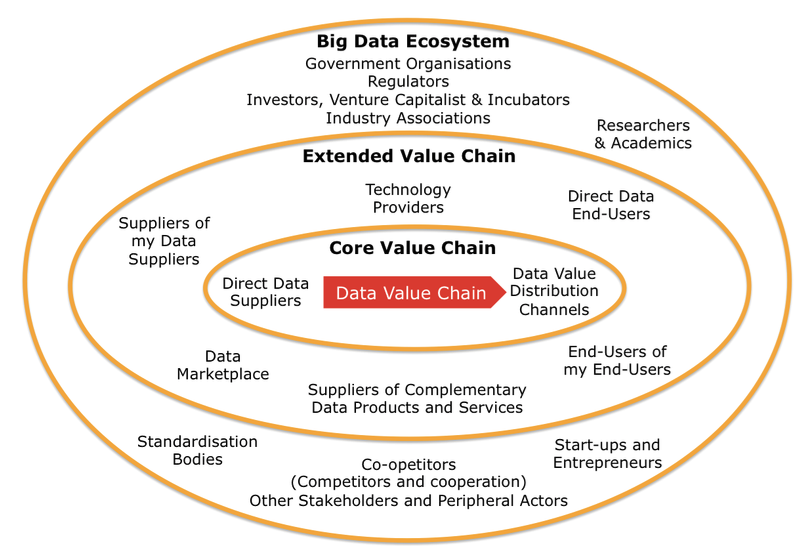Ecosystem Stakeholders
A European big data business ecosystem is an important factor for commercialisation and commodification of big data services, products, and platforms. A successful big data ecosystem would see all “stakeholders interact seamlessly within a Digital Single Market, leading to business opportunities, easier access to knowledge and capital” (European Commission, 2014).

A well-functioning working data ecosystem must bring together the key stakeholders with a clear benefit for all. The key actors in a big data ecosystem, as illustrated above, are:
- Data Suppliers: Person or organisation (Large and SME) that create, collect, aggregate, and transform data from both public and private sources
- Technology Providers: Typically organisations (Large and SME) as providers of tools, platforms, services, and know-how for data management
- Data End Users: Person or organisation from different industrial sectors (private and public) that leverage big data technology and services to their advantage.
- Data Marketplace: Person or organisation that host data from publishers and offer it to consumers/end users.
- Start-ups and Entrepreneurs: Develop innovative data-driven technology, products, and services.
- Researchers and Academics: Investigate new algorithms, technologies, methodologies, business models, and societal aspects needed to advance big data.
- Regulators for data privacy and legal issues.
- Standardisation Bodies: Define technology standards (both official and de-facto) to promote the global adoption of big data technology.
- Investors, Venture Capitalists and Incubators: Person or organisation that provide resources and services to develop the commercial potential of the ecosystem.
Toward a Big Data Ecosystem
Enabling a European wide data ecosystem will require a number of technical challenges to be overcome associated with the cost and complexity of publishing and utilising data. Current ecosystems face a number of problems such as data discovery, curation, linking, synchronization, distribution, business modelling, sales and marketing. A number of key societal and environmental challenges need to be overcome to establish effective big data ecosystems; these include but are not limited to:
- Understanding the value and contribution of big data technology
- Determining the value of data
- Identification of business models that will support a data-driven ecosystem
- Enabling entrepreneurs and venture capitalists to easily access the ecosystem
- Preservation of privacy and security for all actors in the ecosystem
- Reducing fragmentation of languages, intellectual property rights, laws, and policy practices between EU countries
Excerpt from: Curry, E. (2016) ‘The Big Data Value Chain: Definitions, Concepts, and Theoretical Approaches’, in Cavanillas, J. M., Curry, E., and Wahlster, W. (eds) New Horizons for a Data-Driven Economy: A Roadmap for Usage and Exploitation of Big Data in Europe. Springer International Publishing. doi: 10.1007/978-3-319-21569-3_3.
References
- European Commission (2014) Towards a thriving data-driven economy, Communication from the commission to the European Parliament, the council, the European economic and social Committee and the committee of the regions. Brussels. Available at: https://ec.europa.eu/digital-agenda/en/news/communication-data-driven-economy.
- Moore, J. F. (1996) The Death of Competition: Leadership and Strategy in the Age of Business Ecosystems. HarperCollins. Available at: http://books.google.com/books?id=At7HQgAACAAJ&pgis=1.